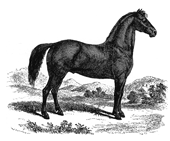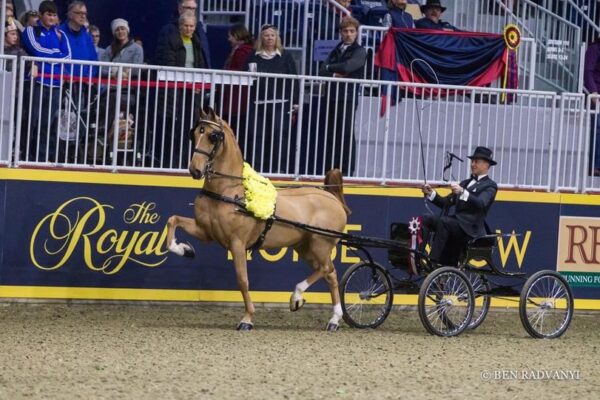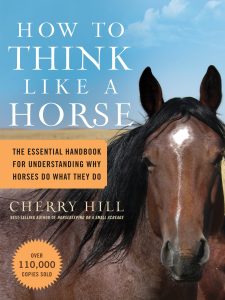
Breed Facts
Status:
Critical
Use:
Riding, Driving
Adult Weight:
1000-1200 lbs.
Adult Height:
15-16 hands
Temperament:
Docile, Spirited, Sensitive, Friendly
Experience Level:
Novice-Intermediate
Notes:
Long, reaching stride; fluid shoulder action; athletic; gaited; extremely rare; should not be confused with Hackney Ponies
HACKNEY HORSE
The Hackney had its origins among the native horses of eastern England, including the Norfolk Trotter and Yorkshire Roadster from Norfolk, Yorkshire, Lincolnshire, and East Anglia. These horses were bred to be elegant and have great speed. The introduction of Thoroughbred to this genetic base in the late 1700s gave rise to the Hackney breed, the first of which is believed to be “The Shales Horse” foaled in 1760.
Roadsters (horses used for light driving rather than for draft work) of this time period were expected to have stamina as well as speed. Tom Ryder, who wrote a history of the Hackney, states that long-distance trotting was this breed’s strength. For example, “Wroot’s Pretender”, one of the best known of the early Hackneys, once won a match race of seventeen miles by trotting it in less than one hour. Races of 100 miles were not unheard of, and Hackneys could cover these distances in less than ten hours. Hackneys were also ridden, and a mare named Phenomenon who lived in the 1800s trotted 17 miles in 56 minutes; her daughter, Phenomena, trotted 17 miles in 53 minutes!
The Hackney Stud Book Society was established in England in 1883, and “Hackney” was formalized as the official breed name. This time period is considered the Golden Age of Driving, and Hackney horses were in great demand, being valued as alert, hardy horses that possessed both speed and style. The invention of the railroad, however, changed the use of horses significantly. Driving distances became much shorter, and selection for style was emphasized over stamina. The result was carriage horses of lighter type and higher action, similar to the pleasure and show types of today.
The Hackney horse is related to but distinct from the Hackney pony, which was established in the 1870s by crossing Hackney horses with Welsh, Fell, and some other pony breeds. The pony breed is especially popular in North America, where it is not in need of conservation.
Hackney horses stand 15-16 hands (60-64″) at the withers and weigh 1,000-1,200 lbs. They have a small head and ears and appear alert. Their body is compact and muscular, with a broad chest and sloping shoulder. Their tail is long or docked and high carriage is desired. The legs are of medium length with large, strong joints, and the feet are durable. Breed colors are primarily bay, brown, chestnut, and black, with or without white markings.
The hallmark of the breed is its fluid and free with high, ground-covering knee action. Rear leg action is similar but not as extreme. Hocks should be raised high under the body. Forward movement should be straight and true, and the overall effect should be brilliant and almost startling.
The Hackney Horse breed is uncommon worldwide, with a global population of around 3,000. Most are found in Britain, with fewer than 200 Hackneys in North America and about 300 in Argentina. The breed type varies from place to place and strain to strain. Most strains have had recent introductions of Thoroughbred blood, and the British studbook allows a limited amount of this crossing. Relatively few strains retain the pure genetics of the historic Hackney breed, and these are a conservation priority.
They are a docile, friendly, easily trained horse. As they can also be sensitive, they do best if trained with gentle training methods. The Hackney retains athletic versatility, and the breed can excel for intermediate to advanced carriage or competitive drivers. They can be ridden and do well in dressage and as jumping horses.
Although Hackneys are generally hardy and healthy during their careers, it is worth noting that their high-stepping movement can cause arthritis and joint pain, so allowing natural movement and providing joint supplements and massage can be beneficial in keeping them sound.
Did you know:
The Livestock Conservancy is America’s leading organization working to save over 190 heritage breeds from extinction. We rely on the support of our members, grants, and donations from the public to raise the $1 million needed each year to maintain our conservation work with rare breeds of farm animals. Click here to learn how you can help.
You may be interested in…
Managing Breeds for a Secure Future
By Dr. Phil Sponenberg, Dr. Alison Martin, Jeannette Beranger
$34.95
Manual of Methods for Preservation of Valuable Equine Genetics
By Kindra Rader, Charles C. Love, Charlene R. Couch and Katrin Hinrichs
$19.95

Breed Facts
Status:
Critical
Use:
Riding, Driving
Adult Weight:
1000 – 1200 lbs
Temperament:
Docile, Spirited
Experience Level:
Novice – Intermediate
Notes:
Long, reaching stride, fluid shoulder action, athletic, gaited, extremely rare
You may be interested in…
Managing Breeds for a Secure Future
By Dr. Phil Sponenberg, Dr. Alison Martin, Jeannette Beranger
$34.95
Manual of Methods for Preservation of Valuable Equine Genetics
By Kindra Rader, Charles C. Love, Charlene R. Couch and Katrin Hinrichs
$19.95






